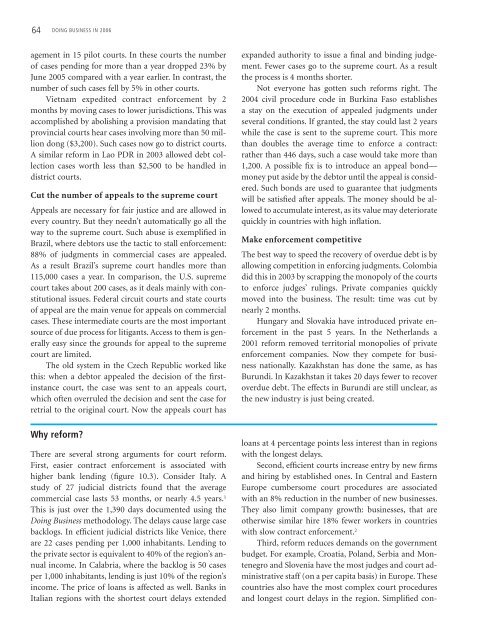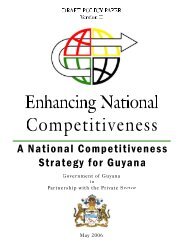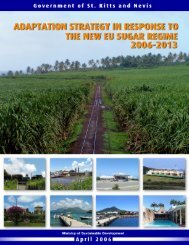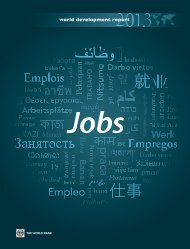Creating
Doing Business in 2006 -- Creating Jobs - Caribbean Elections
Doing Business in 2006 -- Creating Jobs - Caribbean Elections
Create successful ePaper yourself
Turn your PDF publications into a flip-book with our unique Google optimized e-Paper software.
64 DOING BUSINESS IN 2006<br />
loans at 4 percentage points less interest than in regions<br />
with the longest delays.<br />
Second, efficient courts increase entry by new firms<br />
and hiring by established ones. In Central and Eastern<br />
Europe cumbersome court procedures are associated<br />
with an 8% reduction in the number of new businesses.<br />
They also limit company growth: businesses, that are<br />
otherwise similar hire 18% fewer workers in countries<br />
with slow contract enforcement. 2<br />
Third, reform reduces demands on the government<br />
budget. For example, Croatia, Poland, Serbia and Montenegro<br />
and Slovenia have the most judges and court administrative<br />
staff (on a per capita basis) in Europe. These<br />
countries also have the most complex court procedures<br />
and longest court delays in the region. Simplified conagement<br />
in 15 pilot courts. In these courts the number<br />
of cases pending for more than a year dropped 23% by<br />
June 2005 compared with a year earlier. In contrast, the<br />
number of such cases fell by 5% in other courts.<br />
Vietnam expedited contract enforcement by 2<br />
months by moving cases to lower jurisdictions. This was<br />
accomplished by abolishing a provision mandating that<br />
provincial courts hear cases involving more than 50 million<br />
dong ($3,200). Such cases now go to district courts.<br />
A similar reform in Lao PDR in 2003 allowed debt collection<br />
cases worth less than $2,500 to be handled in<br />
district courts.<br />
Cut the number of appeals to the supreme court<br />
Appeals are necessary for fair justice and are allowed in<br />
every country. But they needn’t automatically go all the<br />
way to the supreme court. Such abuse is exemplified in<br />
Brazil, where debtors use the tactic to stall enforcement:<br />
88% of judgments in commercial cases are appealed.<br />
As a result Brazil’s supreme court handles more than<br />
115,000 cases a year. In comparison, the U.S. supreme<br />
court takes about 200 cases, as it deals mainly with constitutional<br />
issues. Federal circuit courts and state courts<br />
of appeal are the main venue for appeals on commercial<br />
cases. These intermediate courts are the most important<br />
source of due process for litigants. Access to them is generally<br />
easy since the grounds for appeal to the supreme<br />
court are limited.<br />
The old system in the Czech Republic worked like<br />
this: when a debtor appealed the decision of the firstinstance<br />
court, the case was sent to an appeals court,<br />
which often overruled the decision and sent the case for<br />
retrial to the original court. Now the appeals court has<br />
Why reform?<br />
There are several strong arguments for court reform.<br />
First, easier contract enforcement is associated with<br />
higher bank lending (figure 10.3). Consider Italy. A<br />
study of 27 judicial districts found that the average<br />
commercial case lasts 53 months, or nearly 4.5 years. 1<br />
This is just over the 1,390 days documented using the<br />
Doing Business methodology. The delays cause large case<br />
backlogs. In efficient judicial districts like Venice, there<br />
are 22 cases pending per 1,000 inhabitants. Lending to<br />
the private sector is equivalent to 40% of the region’s annual<br />
income. In Calabria, where the backlog is 50 cases<br />
per 1,000 inhabitants, lending is just 10% of the region’s<br />
income. The price of loans is affected as well. Banks in<br />
Italian regions with the shortest court delays extended<br />
expanded authority to issue a final and binding judgement.<br />
Fewer cases go to the supreme court. As a result<br />
the process is 4 months shorter.<br />
Not everyone has gotten such reforms right. The<br />
2004 civil procedure code in Burkina Faso establishes<br />
a stay on the execution of appealed judgments under<br />
several conditions. If granted, the stay could last 2 years<br />
while the case is sent to the supreme court. This more<br />
than doubles the average time to enforce a contract:<br />
rather than 446 days, such a case would take more than<br />
1,200. A possible fix is to introduce an appeal bond—<br />
money put aside by the debtor until the appeal is considered.<br />
Such bonds are used to guarantee that judgments<br />
will be satisfied after appeals. The money should be allowed<br />
to accumulate interest, as its value may deteriorate<br />
quickly in countries with high inflation.<br />
Make enforcement competitive<br />
The best way to speed the recovery of overdue debt is by<br />
allowing competition in enforcing judgments. Colombia<br />
did this in 2003 by scrapping the monopoly of the courts<br />
to enforce judges’ rulings. Private companies quickly<br />
moved into the business. The result: time was cut by<br />
nearly 2 months.<br />
Hungary and Slovakia have introduced private enforcement<br />
in the past 5 years. In the Netherlands a<br />
2001 reform removed territorial monopolies of private<br />
enforcement companies. Now they compete for business<br />
nationally. Kazakhstan has done the same, as has<br />
Burundi. In Kazakhstan it takes 20 days fewer to recover<br />
overdue debt. The effects in Burundi are still unclear, as<br />
the new industry is just being created.

















